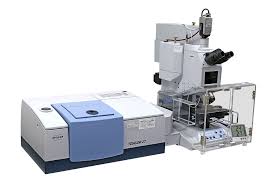Description
A spectrofluorimeter (or spectrofluorometer) is a sophisticated analytical instrument used to measure the intensity and wavelength distribution of fluorescent light emitted by a sample upon excitation by a specific wavelength of light. It plays a crucial role in fluorescence spectroscopy, a technique widely employed in biochemistry, molecular biology, environmental science, and materials science for analyzing the presence and concentration of fluorescent molecules.
Long Description:
The spectrofluorimeter operates by directing a beam of light—typically from a xenon or mercury arc lamp, or more recently, a laser or LED—at a sample. This excitation light is of a specific wavelength, selected by a monochromator or optical filter, and is absorbed by the sample, causing certain molecules to become excited. As these excited molecules return to their ground state, they emit light (fluorescence) at a longer wavelength. The emitted fluorescent light is collected at a 90-degree angle to the incident light to minimize the detection of scattered excitation light. This emission is then passed through another monochromator, which isolates specific wavelengths of the emitted light for detection.
The detection system typically includes a photomultiplier tube (PMT) or other sensitive detectors capable of measuring very low levels of light. The resulting data is presented as an emission spectrum (intensity vs. wavelength), which provides insights into the molecular composition, environment, and concentration of the sample.
Spectrofluorimeters can be used in both qualitative and quantitative analyses. In addition to steady-state fluorescence measurements, many modern instruments are capable of time-resolved fluorescence, polarization/anisotropy measurements, and synchronous scanning, expanding their utility across many disciplines.
Applications:
Biochemical assays: Protein-ligand binding, enzyme activity, DNA/RNA quantification
Clinical diagnostics: Detection of biomarkers, disease diagnostics
Environmental monitoring: Detection of pollutants and trace elements
Material science: Analysis of fluorescent dyes, quantum dots, and nanoparticles
Pharmaceutical research: Drug screening and molecular interaction studies
Advanced spectrofluorimeters often integrate with computer systems for data acquisition, processing, and storage, and may feature automated sample handling for high-throughput applications. Their high sensitivity and specificity make them indispensable tools in both research and industrial laboratories.






Reviews
There are no reviews yet.